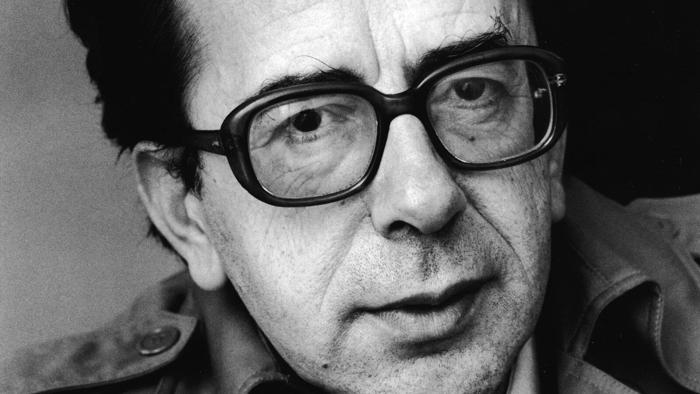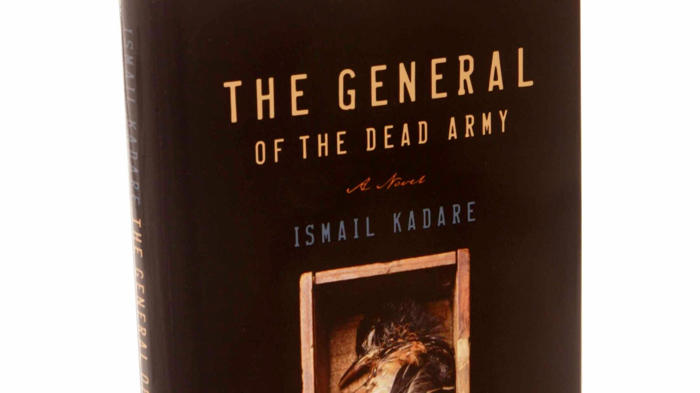Ismail Kadare Dies at 88; Novels Brought Albania’s Plight to the World

Ismail Kadare, shown in the 1970s, received the inaugural Man Booker International Prize (now the International Booker Prize) in 2005.
Ismail Kadare, the Albanian novelist and poet who single-handedly wrote his isolated Balkan homeland onto the map of world literature, creating often dark, allegorical works that obliquely criticized the country’s totalitarian state, died on Monday in Tirana, Albania. He was 88.
His death was confirmed by Bujar Hudhri, the head of the Onufri Publishing House, his editor and publisher in Albania, who said that he went into cardiac arrest at his home and died at a hospital in Tirana, the Albanian capital.
In a literary career that spanned half a century, Mr. Kadare (pronounced kah-dah-RAY) wrote scores of books, including novels and collections of poems, short stories and essays. He shot to international fame in 1970 when his first novel, “The General of the Dead Army,” was translated into French. European critics hailed it as a masterpiece.
Mr. Kadare’s name was floated several times for the Nobel Prize, but the honor eluded him. In 2005, he received the inaugural Man Booker International Prize (now the International Booker Prize), awarded to a living writer of any nationality for overall achievement in fiction. The finalists included such literary titans as Gabriel García Márquez and Philip Roth.

Mr. Kadare shot to international fame in 1970 when his first novel, “The General of the Dead Army,” was translated into French. European critics hailed it as a masterpiece.
In awarding the prize, John Carey, a British critic and the panel’s chairman, called Mr. Kadare “a universal writer in a tradition of storytelling that goes back to Homer.”
Critics often compared Mr. Kadare to Kafka, Kundera and Orwell, among others. During the first three decades of his career, he lived and wrote in Albania, at the time under the grip of one of the eastern bloc’s most brutal and idiosyncratic dictators, Enver Hoxha.
To escape persecution in a country where more than 6,000 dissidents were executed and some 168,000 Albanians were sent to prison or labor camps, Mr. Kadare walked a political tightrope. He served for 12 years as a deputy in Albania’s People’s Assembly, and was a member of the regime’s Writers Union. One of Mr. Kadare’s novels, “The Great Winter,” was a favorable portrayal of the dictator. Mr. Kadare later said he had written it to curry favor.

“The only act of resistance possible in a classic Stalinist regime was to write,” Mr. Kadare once said,
In contrast, several of his most brilliant works, including “The Palace of Dreams” (1981), subversively attacked the dictatorship, skirting censorship through allegory, satire, myth and legend.
Mr. Kadare “is a supreme fictional interpreter of the psychology and physiognomy of oppression,” Richard Eder wrote in The New York Times in 2002.
Ismail Kadare was born on Jan. 28, 1936, in the southern Albanian town of Gjirokaster. His father, Halit Kadare, was a civil servant; his mother, Hatixhe Dobi, was a homemaker from a wealthy family.
When Hoxha’s communists seized control of Albania in 1944, Ismail was 8 years old and already immersing himself in world literature. “At the age of 11 I had read Macbeth, which had hit me like lightning, and the Greek classics, after which nothing had any power over my spirit,” he recalled in a 1998 interview with The Paris Review.
Yet, as an adolescent, he was attracted to communism. “There was an idealistic side to it,” he said. “You thought that perhaps certain aspects of communism were good in theory, but you could see that the practice was terrible.”
After studies at Tirana University, in the Albanian capital, Mr. Kadare was sent for postgraduate study to the Gorky Institute for World Literature in Moscow, which he later described as “a factory for fabricating dogmatic hacks of the socialist-realism school.”
In 1963, about two years after his return from Moscow, “The General of the Dead Army” was published in Albania. In the novel, an Italian general returns to the mountains of Albania 20 years after World War II to disinter and repatriate the bodies of his soldiers; it is a tale of the advanced West intruding into a strange land, ruled by an ancient code of blood feuds.
Critics that were pro-government condemned the novel as being too cosmopolitan and for not expressing sufficient hatred for the Italian general, but it made Mr. Kadare a national celebrity. In 1965, the authorities banned his second novel, “The Monster,” immediately after its publication in a magazine. In 1970, when “The General of the Dead Army” was published in a French translation, it took “literary Paris by storm,” The Paris Review wrote.
Mr. Kadare’s sudden prominence drew the surveillance of the dictator himself. To placate the regime, Mr. Kadare wrote “The Great Winter” (1977), a novel celebrating Hoxha’s break with the Soviet Union in 1961. Mr. Kadare said he had three choices: “To conform to my own beliefs, which meant death; complete silence, which meant another kind of death; or to pay a tribute, a bribe.” He chose the third solution, he said, by writing “The Great Winter.”
In 1975, after Mr. Kadare wrote “The Red Pashas,” a poem criticizing members of the Politburo, he was banished to a remote village and barred from publishing for a time.
His response came in 1981, when he published “The Palace of Dreams,” a damning critique of the regime. Set during the Ottoman Empire, it portrays a vast bureaucracy devoted to collecting the dreams of its citizens, searching for signs of dissidence. In his review for The Times, Mr. Eder described it as a “moonlit parable about the insanity of power — murderous and suicidal at the same time.” The novel was banned in Albania, but not before it sold out.
Mr. Kadare’s success abroad afforded him some security at home. Still, he said, he lived with the fear that the regime might “kill me and say that it was a suicide.”
To protect his work from manipulation in the event of his death, Mr. Kadare smuggled manuscripts out of Albania in 1986, delivering them to his French publisher, Claude Durand. The publisher in turn used his own trips to Tirana to smuggle out additional writings.
The cat-and-mouse game in which the regime by turns published and banned Mr. Kadare’s works continued past Hoxha’s death in 1985, until Mr. Kadare fled to Paris in 1990. After the regime’s collapse, Mr. Kadare came under attack from anti-communist critics, both in Albania and in the West, who portrayed him as a beneficiary and even an active supporter of the Stalinist state. In 1997, when his name was being mentioned for the Nobel, an article in the conservative Weekly Standard urged the committee not to award him the prize because of his “conscious collaboration” with the Hoxha regime.
Apparently to inoculate himself against such criticism, Mr. Kadare published several autobiographical books in the 1990s in which he suggested that through his literature he had resisted the regime, both spiritually and artistically.
“Every time I wrote a book,” he said in the 1998 interview, “I had the impression that I was thrusting a dagger into the dictatorship.”
Writing in 1997 in The New York Review of Books, Noel Malcolm, an Oxford historian, praised the “atmospheric density” and “poetic tautness” of Mr. Kadare’s writing, but chastised his defensiveness with critics.
“The author doth protest too much,” Mr. Malcolm wrote, warning that Mr. Kadare’s “elisions and omissions” of his “self-promoting volumes” could damage his reputation more than his critics’ attacks. Mr. Kadare’s most vital works “took place on a different plane, at once more human and more mythic, from that of any type of ideological art,” he wrote.
In a thin-skinned response, Mr. Kadare accused Mr. Malcolm of exhibiting cultural arrogance against an author from a small country.
“To take such a liberty with a writer just because he happens to come from a small country is to reveal a colonialist mentality,” Mr. Kadare wrote in a letter to The New York Review of Books.
Information on survivors was not immediately available.
After the collapse of communism, Mr. Kadare continued to set his novels amid the suspicion and terror of the Hoxha regime. A few, however, portrayed Albanians living in 21st century Europe but still haunted by their nation’s blood-feuds, legends and myths. His best-known works include “Chronicle in Stone” (1971); “The Three-Arched Bridge” (1978); “Agamemnon’s Daughter” (1985); its sequel, “The Successor” (2003); and “The Accident” (2010).
All his works shared a strength, Charles McGrath wrote in The Times in 2010. Mr. Kadare is “seemingly incapable of writing a book that fails to be interesting.”
In 2005, after he won the Booker International Prize, Mr. Kadare said: “The only act of resistance possible in a classic Stalinist regime was to write.”
Amelia Nierenberg contributed reporting.
